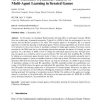66 search results - page 10 / 14 » A Game Theoretical Model for Adversarial Learning |
120
click to vote
UAI
2004
15 years 1 months ago
2004
Exponential models of distributions are widely used in machine learning for classification and modelling. It is well known that they can be interpreted as maximum entropy models u...
ATAL
2010
Springer
15 years 23 days ago
2010
Springer
Multi-agent learning is a crucial method to control or find solutions for systems, in which more than one entity needs to be adaptive. In today's interconnected world, such s...
137
click to vote
AAMAS
2006
Springer
14 years 11 months ago
2006
Springer
In this paper, we investigate Reinforcement learning (RL) in multi-agent systems (MAS) from an evolutionary dynamical perspective. Typical for a MAS is that the environment is not ...
111
click to vote
FLAIRS
2009
14 years 9 months ago
2009
In this paper, we investigate the hypothesis that plan recognition can significantly improve the performance of a casebased reinforcement learner in an adversarial action selectio...
108
click to vote
AAAI
2008
15 years 2 months ago
2008
This paper examines, by argument, the dynamics of sequences of behavioural choices made, when non-cooperative restricted-memory agents learn in partially observable stochastic gam...

